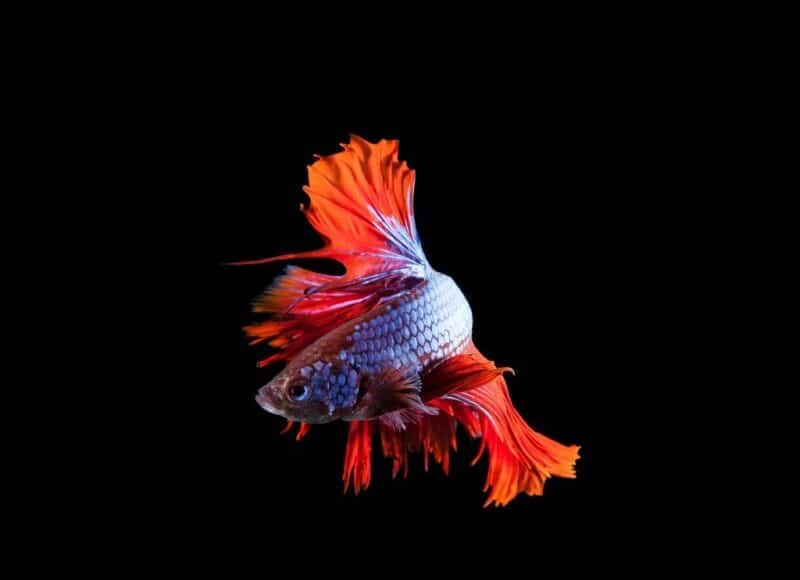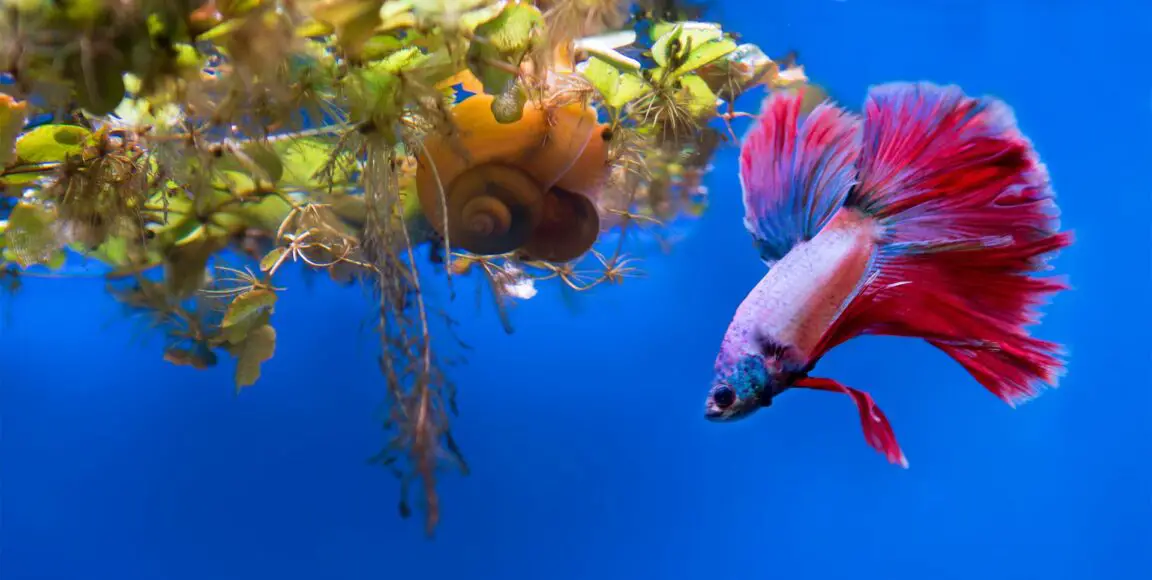Last Updated on February 20, 2023
Betta fish are among the most beautiful aquarium pets.
They have vibrant colors that add charm to your place, and being curious and intelligent makes them one of the perfect home pets.
But, with their vibrant appearance, have you ever wondered how they perceive those colors?
This post is for betta fish owners and enthusiasts who want to learn more about how these beautiful fish see the world around them.
Table of Contents
Can betta fish see colors?

To put it simply: Yes, they can.
Betta fish can see colors and are good at identifying shapes!
They can see well in short distances, but betta fish vision is not that sharp.
Betta fish have a monocular vision that allows them to see objects in two different directions, which means they can see two images simultaneously.
Monocular vision helps them see potential dangers from the directions of each of their eyes, but it may also be harder for them to focus on specific objects.
Betta fish can see colors, but what they see may vary since colors have different light wavelengths.
Also, recognizing the colors in depth is not their forte.
The iris of betta fish is slow in recognizing colors like orange and red, wherein both colors have longer wavelengths, so immediately adjusting to different lights is difficult for them.
Lastly, various types of betta fish species also have different color visions.
For instance, the Crown and Veil tail bettas have better color vision and recognition than Delta and Double tail bettas.
Do bettas have favorite colors?

There isn’t enough evidence whether betta fish like a specific color, but since they have their quirks, having a color preference can be their thing too.
To give you an idea, colors determine how your betta will respond to other tank mates.
Some males can become aggressive to specific colors that they think threaten their spaces.
You can see how your betta fish react to certain colors when they flare their gills and dart around the tank.
For instance, I’ve had a red betta that flares to my blue betta right away, but I also had an orange betta that didn’t show the same behaviors on the same fish.
Besides my experience, another great example is from a Reddit user who shared that the color their betta fish likes is pink, and the other user said his betta likes the color of fire.
So check how your betta behaves when you introduce a different tank mate to ensure that both will live comfortably with each other’s company.
Figuring out your betta’s favorite color would be a task for you as an owner, as each of them will have their preference.
How do betta fish see color?

The longer the light wavelength is, the faster it is absorbed by the betta.
For example, they can absorb red more quicker, while blue and green are more challenging.
Bettas retina has more cones than rods. Simply put, the more cones they have, the better they focus on objects and see different shades of colors.
But here’s a fun fact: Bettas can see more colors than humans.
Aside from what we perceive, betta fish can also see ultraviolet colors.
But this will still vary on the betta fish. For instance, some betta may see blue and green but not red.
Also, remember that their color perception is not as good as ours.
After all, they live underwater, and the situations in their environment are different.
Factors that can affect your betta fish vision
As a betta fish owner, it’s important to understand that several factors can affect your betta fish’s eyesight. Here are some key factors to keep in mind:
- Clearness of the water: Clear water is crucial for your betta fish to see clearly. If the water in their tank is cloudy or murky, it can affect their vision and make it difficult for them to see their surroundings.
- Distance of the object: Bettas can see things relatively close to them, but their vision may become blurry at longer distances. Providing your betta with a spacious tank will allow them to see more of the things around them.
- Brightness/darkness of the room: Bettas have good vision in well-lit areas, so providing them with a well-lit environment is crucial. Too dim light can make it difficult for them to see things. On the other hand, too much bright light can cause glare and affect their vision. So, make sure to keep your betta fish tank in a room with appropriate artificial light.
Do betta fish change color?
Now that we know that bettas can see colors, do they also change colors?
The short answer is yes. But this is something that is out of their control. Time and natural environment are the common reasons why their vibrant colors disappear.
Stress
When a betta is stressed, it may develop “stress stripes.”
These stripes are visible from the gills to the tail and can be a combination of colors such as red, black, or white.
Various factors, including a dirty or overcrowded tank, incompatible tankmates, or sudden changes in water temperature or quality can trigger stress.
Aging
As bettas age, their colors may change and fade over time.
This is a natural process and usually occurs as the betta approaches its life expectancy of around five years.
The vibrancy of their colors may become less intense or become more muted.
Illness
Bacterial and fungal infections can lead to discolorations on your betta’s body.
These discolorations may appear as patches or spots, and the colors may differ from the betta’s usual vibrant hues.
A common disease that affects bettas is ich, which appears as white spots on the body and fins.
Water Quality
Besides illness, poor water quality can also affect your betta fish’s color.
Water that is too acidic or alkaline can lead to discoloration or fading of a betta’s colors.
High ammonia, nitrites, or nitrates can also impact a betta’s coloration.
It’s crucial to test the water regularly and maintain proper water parameters to keep your betta healthy and vibrant.
Genetics
Betta fish are bred for their unique coloration and fin types, and genetics play a significant role in their appearance.
Color changes can occur due to selective breeding, where certain traits are emphasized over time, resulting in different colors and patterns.
As a result, it’s common to see bettas change colors as they age or through selective breeding practices.
Related: Do Betta Fish Change Color?
Can betta fish see in the dark?

Bettas cannot see well in the dark.
Having artificial lights on your tank will illuminate the natural color of your betta. But as much as it highlights the color of your pet, it’s also beneficial to your pet fish.
Bettas are used to dark and muddy waters as they live in rice paddies and swamps. But in their natural environment, natural sunlight is their primary source of light that helps them navigate their areas and find food easily.
They also identify light as daytime and darkness as nighttime. Daytime is for finding food, while nighttime is their time to sleep.
Knowing this helps them sleep better, and the dangers of not having this differentiation can affect their sleeping schedule.
Even though they have poor night vision, they can still navigate within the area using other senses.
But you don’t have to worry about their activities at night, as they will spend most of their nighttime sleeping.
What colored lights do betta fish like?
Betta fish prefer muted or toned-down colored lights, so it’s best to avoid bright and harsh lighting in their tank.
Bright tank lights can cause stress and discomfort for bettas and encourage the growth of unwanted algae in the tank.
Colors such as purple and blue are good options for betta fish, as they provide a subdued and calming light that mimics the natural light of dawn and dusk.
These colors are not too bright, which makes them suitable for bettas.
Related: Do Bettas Like Light? All Your Questions Answered!
Types of aquarium light for betta fish tank
Your betta needs to live in a place that mimics its natural habitat. Here are the common lights available:
Fluorescent
A fluorescent bulb is the go-to lighting for betta as it doesn’t produce much heat and has a longer life span. It also encourages plant growth if live plants are in the fish tank.
LED
LEDs are economical and don’t heat the water inside the aquarium. It’s widely used among betta owners, as it also mimics natural sunlight and doesn’t encourage algae growth.
LED lights are an excellent choice for betta fish tanks, as they are energy-efficient and offer a range of color options.
Many LED lights come with a remote control that allows you to adjust the color and intensity of the light, making it easy to create the perfect lighting environment for your betta.
Incandescent
Incandescent bulbs tend to get hot and heat the water more quicker, especially in smaller tanks. Water temperature can fluctuate, which can negatively affect your betta.
This light is a no-no, so if somebody recommends it to you, it’s best to say no and opt for fluorescent or LED for your betta.
Some key things to remember:
- Make sure your lighting fixtures aren’t too intense, as betta needs to see their surroundings well.
- Turn off the lights at night for them to rest
- Provide shaded areas inside their fish tank
- Keep water temperature between 74 and 78 degrees Fahrenheit (23-26degrees Celsius)
- Do not expose them to direct sunlight
FAQs
Do colored lights affect betta fish?
Yes, colored lights can affect betta fish. It’s important to provide them with appropriate lighting that doesn’t cause stress or harm their health.
Bright or intense light can be stressful for bettas, and it can cause discomfort or even harm to their eyes.
On the other hand, subdued and appropriate lighting can be beneficial to bettas. It can help create a natural day and night cycle for the fish.
Do betta fish prefer light or dark?
Betta fish need light and dark periods for a healthy day/night cycle, with 8-12 hours of light per day and 6-8 hours of darkness at night.
Too much light can be stressful and harmful, while too much darkness can also impact their behavior.
A timer can control light exposure, ensuring a natural light cycle to promote betta health and well-being.
Final thoughts
While the exact depth of a betta fish’s color perception is still not fully understood, it’s clear that they can see a range of colors.
As betta owners, it’s important to keep in mind the factors that can affect their eyesight, such as water clarity, lighting, and overall tank health.
Remember to always do your research and provide proper betta care to keep your fish happy and healthy.
